When Gabriel Martinelli's shot deflected off Nathan Aké's face on Sunday, we entered into uncharted territory.
With the 1-0 loss to Arsenal, Manchester City achieved the unthinkable: they lost consecutive Premier League matches in a row. The last time that happened under Pep Guardiola? Boxing Day 2018, a 2-1 loss to Leicester City following a 3-2 loss to Crystal Palace. The only other time that happened under Guardiola was in December 2016, also against (the then-defending champs) Leicester, following a defeat against the eventual champions Chelsea.
Manchester City simply just don't lose soccer games. In Guardiola's seven full seasons with the club, they've averaged five league losses per season. When they won their first title under Pep, in 2017-18, they lost two games total. Last season, they didn't lose their second game until Matchday 14. We're only eight games into this season, and they're already there.
After City put together arguably the best individual season of any club in the modern history of English soccer last season, has something gone stale? "We do not have to win the Premier League," Guardiola said after the Arsenal game. "No team ever has won four Premier Leagues in a row."
City don't have to win the Premier League, and no one has ever won more consecutively, but we all expected them to do it anyway. Will they?
Man City have started slow before
Despite the rarely-seen double-loss and the fact that they're taking Ls at a 25% rate in the Premier League in 2023-24, this isn't City's worst-ever start to a season under Pep. Here's where they sat through eight games in all eight seasons under the current coach:
2016-17: 19 points
2017-18: 22 points
2018-19: 20 points
2019-20: 16 points
2020-21: 15 points
2021-22: 17 points
2022-23: 20 points
2023-24: 18 points
That averages out to just slightly more than 18 points per season. Given that City have won the title in five of the past seven seasons, "average" means "probably the best team in the world." In the three seasons in which City had fewer points than they currently do, they won the Premier League twice and then finished second, but also had the best goal differential in the league.
Even though they're currently in third place and closer to fourth than first, City's results really aren't worrying at all. They've been here before, and they've won the title almost every time they were.
But Man City have never been this slow
Results, of course, don't tell the whole story. The better indicator of team performance through eight games is City's expected-goal differential from non-penalty shots when both teams are playing at even strength. Here's how all eight seasons of Guardiola at the club compare:
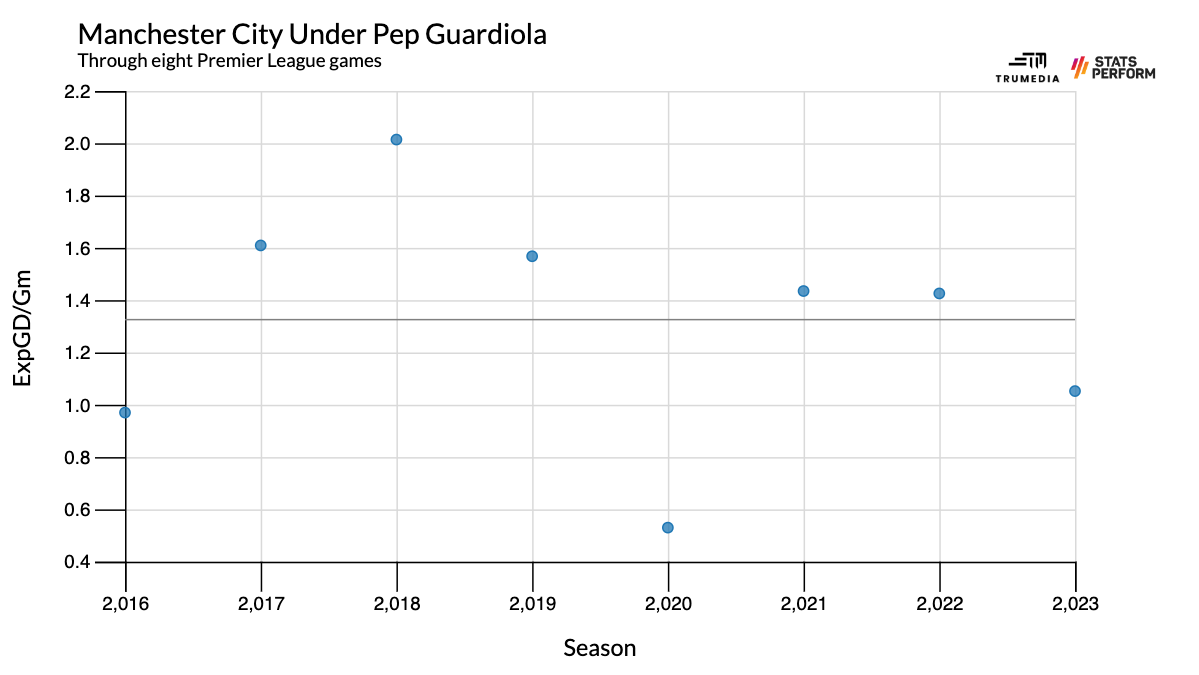
The only times they've been worse to start the season were Pep's first year with the team, when the roster had been partially turned over from the previous era, and 2020-21, when they ended up winning the league by 12 points anyway. And so, even if you've convinced yourself that something is currently broken at City, we have evidence of things previously being much more broken at City through eight games and still ultimately being fixed.
Although City's underlying performance this season is significantly below the average for the Pep Era (the horizontal line), it's still above a plus-1 xG differential. Pretty much the only team to get north of one in the Premier League and not win the league is the Liverpool team that was competing with Manchester City over the past half-decade.
This is how City compare to the rest of the league, by the same metric:
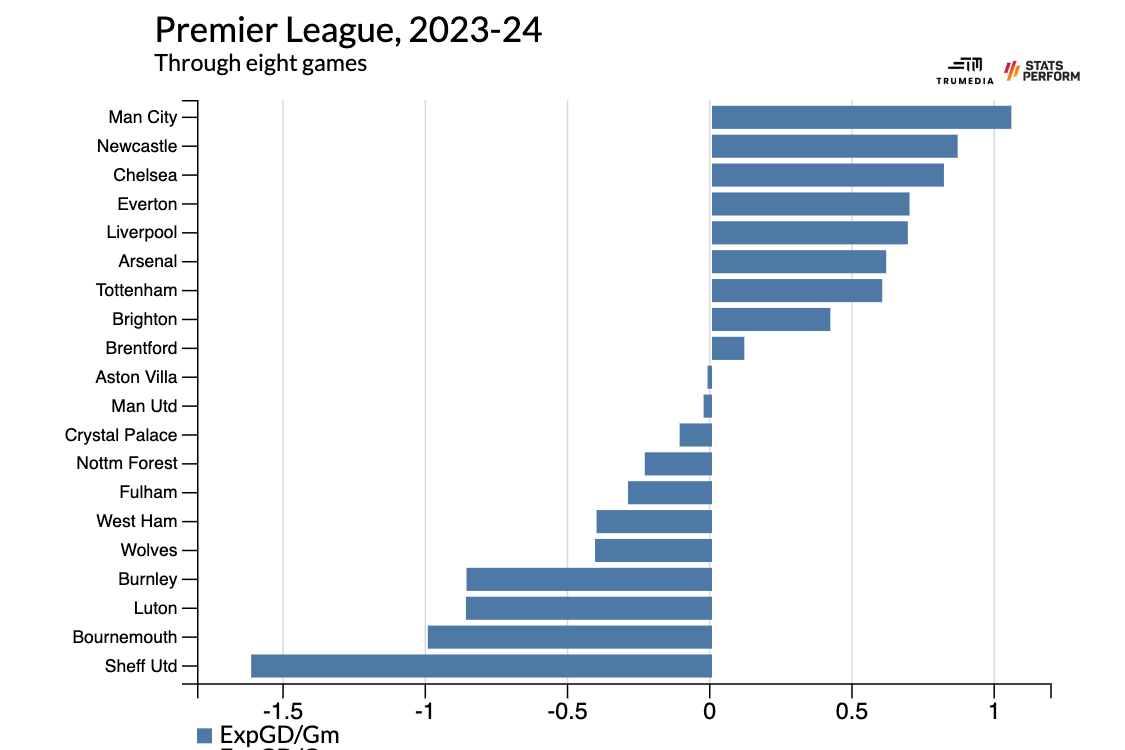
However, eight games means that City still have to play 10 other teams. Based simply on the average power rating (from Stats Perform) of their opponents so far this season, only Brentford, Chelsea and Everton have played an easier schedule than City.
City's next seven games are home to Brighton, away at Manchester United, home to Bournemouth, away to Chelsea, home to Liverpool, home to Tottenham and away to Aston Villa. Other than Bournemouth, all of those teams are projected to finish in the top nine by the betting markets come the end of the season.
Perhaps even more concerning than the upcoming schedule, though, is the stylistic drift. The way that City changed their trajectory in 2020-21 is that they, basically, stopped trying to run. "Direct speed" measures how quickly teams move the ball upfield (in meters per second) once they have possession. There has been a steady decline since Guardiola's first season -- perhaps an indicator of the number of possession-savvy players added to the roster year after year -- but then there's a sudden drop-off for the 2020-21 season, and then after a minor uptick in 21-22, it has continued to plummet.
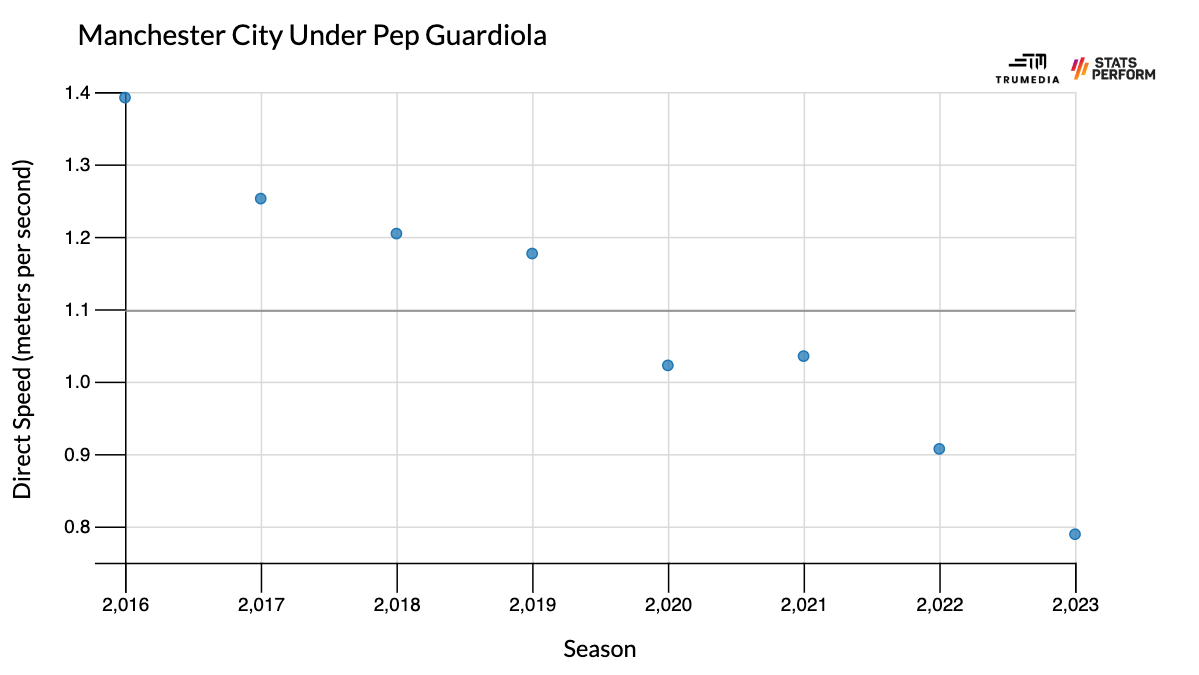
That trend, too, has been mirrored by an increasing deemphasis on pressing high. PPDA essentially measures the number of passes a team allows in their attacking third before attempting a defensive action. The lower the number, the more aggressive the press, and, well ...
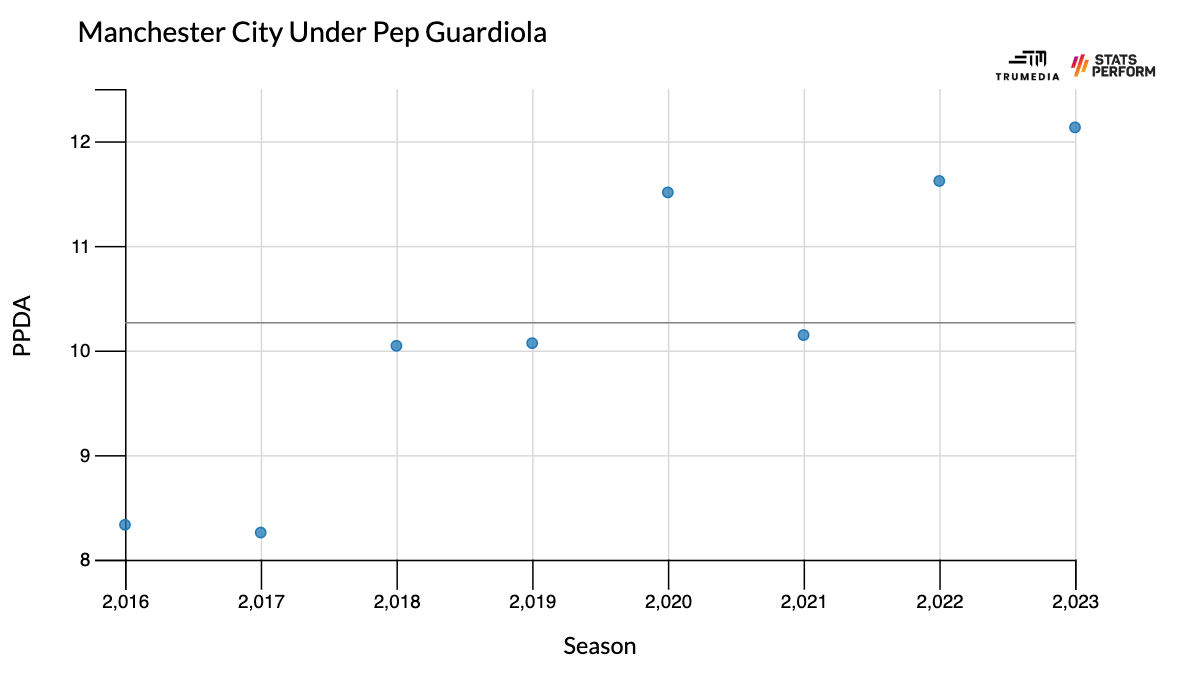
Through eight games, eight teams have posted a lower PPDA than City. And if anything, that's probably overselling how aggressive their press is, given how easy their schedule has been so far. Per Soccerment, City rank 13th in the league for buildup-disruption percentage -- which looks at how often teams complete their passes against you compared to their other opponents.
In a collection of words you've definitely never heard before: City rank one spot below Luton Town and one above Fulham.
Does any of this matter?
If I had to describe City's broad strategy, it's this: hold on to the ball for as long as you can, trust your talent will eventually break your opponent down without risking too many bodies forward, and then settle in behind the ball when you lose it.
Unsurprisingly, there's a pretty clear relationship between how aggressively you press and how much possession you have. If you're constantly winning the ball back from your opponent soon after losing it, well, you'll have more of the ball. City, though, have essentially broken the link so far this season:
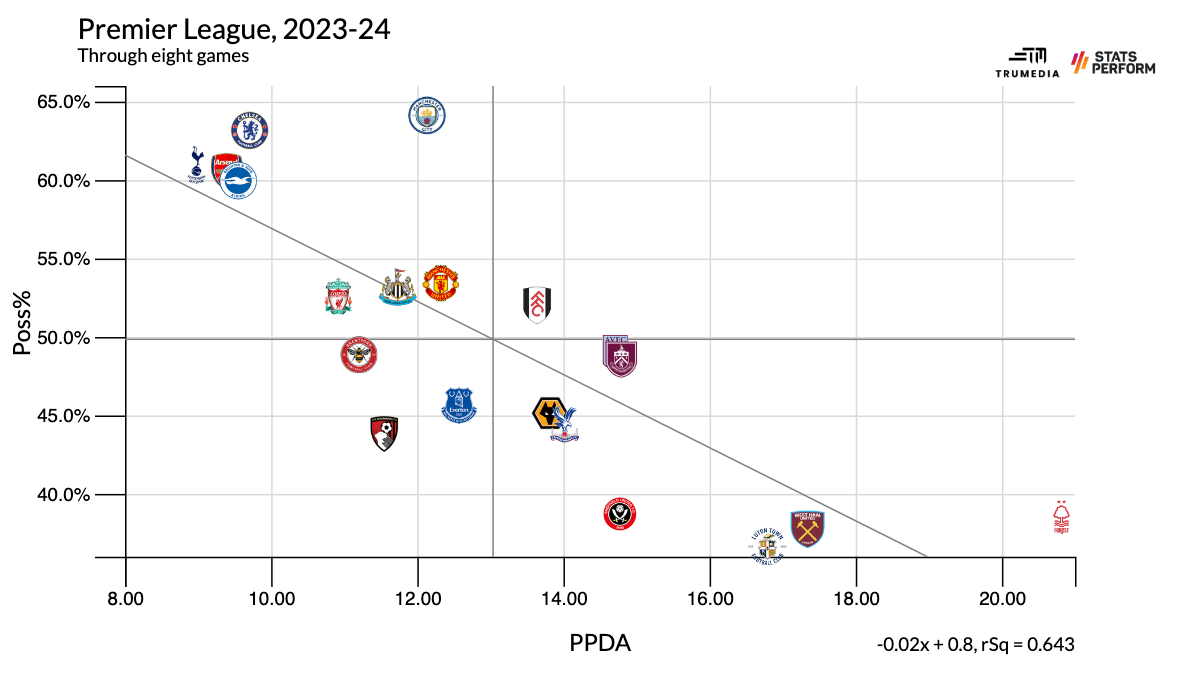
The downside of playing a high-pressing style is that you risk all kinds of space behind your defense and sometimes, your opponent will break the press and you'll give up a couple easy-looking goals. The bet, though, is that you'll overwhelm your opponent with chances more often than not.
City, instead, are making a different kind of trade-off. They're playing more traditional defenders across the backline to make the team more stout against the unpressed possessions they're now facing. That means fewer bodies in the attacking third, and fewer goals -- like we saw in the Liverpool-Brighton game. When the press clicks, you win the ball high and have an easy path to goal.
It's simply a lot harder to score goals without easy, press-driven chances and without as many people in the attacking third. We saw that against Arsenal, as City created only four chances -- the fewest in a match under Guardiola -- despite controlling more than 50% of the ball.
We saw the other downside on Sunday, too. You can't totally control the bounce of the ball. Overall, Arsenal's attack was quite poor Sunday, but even when you give up 12 low-quality shots, one of them can hit one of your defenders in the face and ricochet into the back of the net.
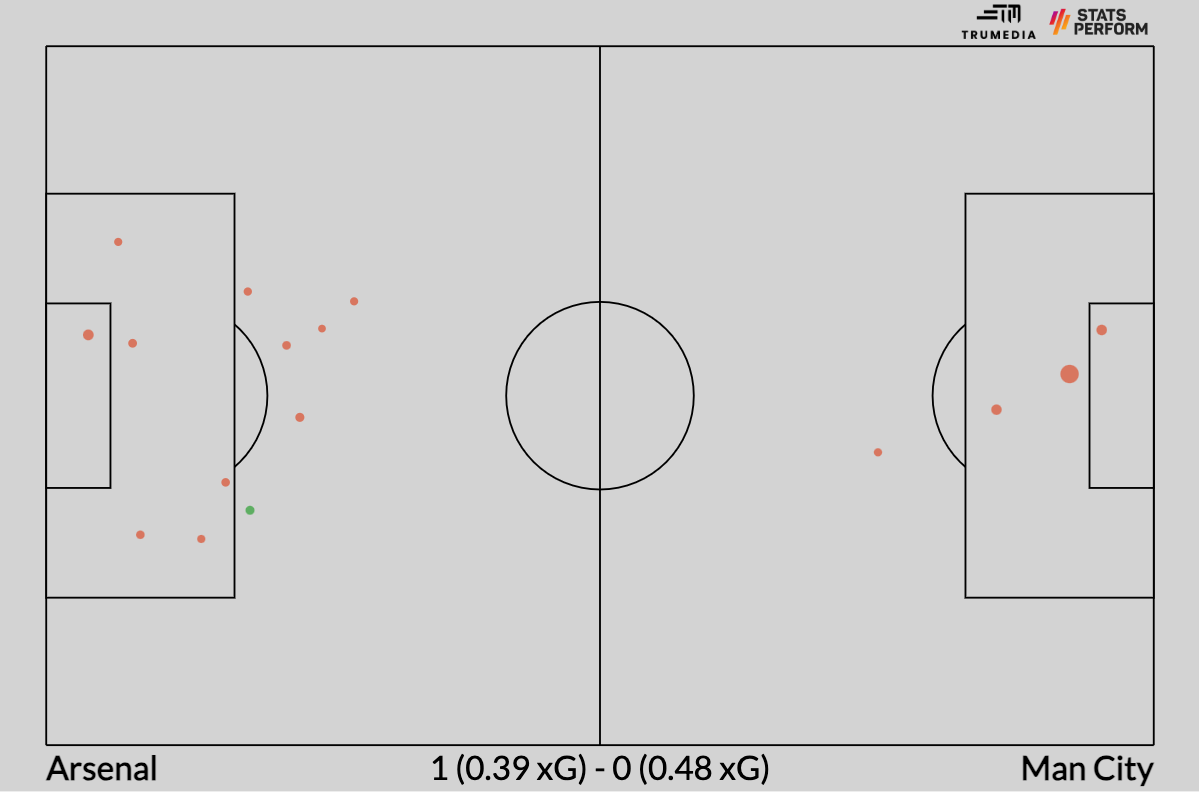
It's possible that this way of playing only works at an elite level when you have the three players City haven't had as much this season.
Kevin De Bruyne is arguably the best creative passer on the planet, and he's featured in just 3.1% of the team's minutes this year. Jack Grealish is one of the few wingers who's so good at both driving and passing the ball into the penalty area that he doesn't need an overlapping fullback to open up space for him. He has played only 27% of the minutes. Rodri, meanwhile, is great at pretty much every aspect of playing soccer, and he has been out there for only about two-thirds of the minutes. None of them played a single minute Sunday.
Rodri will be back after the international break, now that his red card suspension is over, and Grealish will presumably reenter the lineup more consistently as he regains fitness. De Bruyne should return from his injury at some point, too, but he's a 32-year-old who just recently underwent hamstring surgery. There's a legitimate question about whether we'll see last season's KDB ever again.
Then there's a legitimate question about whether this incredibly deliberate style can work anywhere near as well as it did last season without him. In the past, City have been fantastic without De Bruyne on the field, but that was when they were moving at a higher tempo.
Now, it's a lot easier to play slower and not push as many bodies forward when you have a guy who can break a defense open with a single pass from anywhere on the field. This season, City are attempting the fewest shots, creating the fewest xG and registering the fewest touches in the penalty area of the Guardiola era.
Such is the standard at City that a team currently favored to win the Premier League, the Champions League and the FA Cup can seem like they've been disappointing. Chances are that even if the De Bruyne of last year never comes back, Guardiola and City will figure out a way to make this deliberate approach pay off, or they'll make another pivot to a different, successful style. We can be confident in that because we've already seen it multiple times before, with this coach and these financial resources.
However, these first eight games have at least hinted at a potential down year for the club. With some of the stalwarts aging, a key injury to De Bruyne, the departures of Ilkay Gündogan and Riyad Mahrez, and a bunch of summer signings who profile more like long-term projects rather than immediate stars, the arguments are all there. And maybe it'll all become more obvious once the schedule continues to tighten up, the opposition gets harder to break down and the attackers are tougher to neutralize. Or maybe it'll just go like it's always gone.
If City lose their next match, against Brighton, it'll mark their first three-game losing streak across all competitions since the 2017-18 season. Oh, and that happens to be when they set the record for most points in a single Premier League season.
